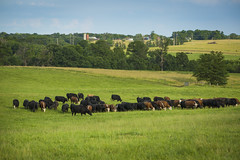Written by Logan Jackson
College of Agriculture, Food and Natural Resources
The Division of Animal Sciences at the University of
Missouri College of Agriculture, Food and Natural Resources (CAFNR) boasts many
strengths, including its vast research and work with beef cattle reproduction
and genetics. The faculty, who have responsibilities not only in research, but
also in teaching, extension and economic development, are experts in taking
their findings and sharing them with farmers, ranchers and the Missouri community
as a whole.

With the help of a $300,000 grant from the United States
Department of Agriculture (USDA), the division will be able to expand on those
leadership opportunities.
The grant, through USDA’s National Institute of Food and Agriculture
(NIFA), will be used to develop The National Center for Applied Reproduction
and Genomics (NCARG) in Beef Cattle. The goal of NCARG will be to promote the
economic impact of the technologies Mizzou Animal Sciences faculty have
developed and are using every day. The focus is on giving farmers and ranchers
the answer to the question – “What is the return on investment if I invest in
reproductive or genomic technologies?”
“We’re not just trying to fill people’s heads with new
knowledge – it’s more about lighting a fire,” said Jared Decker, an Extension
beef geneticist at Mizzou. “We’re focused on helping farmers and ranchers
understand the technology, but, more than that, to trust the technology and
identify ways they can use it. We want to educate producers and help them take
that next leap.”
The multi-disciplinary grant is in partnership with the MU
College of Veterinary Medicine. NCARG will have a big focus on continuing
education for veterinarians, including educational and training opportunities
for veterinary students, graduate students, farmers, ranchers and allied
industry professionals.
“This center again underscores the collaborative environment
between schools and programs that exist at Mizzou to advance training for
veterinary and animal science students, and research that benefits Missouri
stakeholders,” said College of Veterinary Medicine Interim Dean Carolyn Henry,
DVM, MS, DACVIM (Oncology).
The idea for a center of this type has been discussed
amongst faculty in the Division of Animal Sciences for the past few years.
David Patterson and Mike Smith, both professors of reproductive physiology, have
taught numerous full-day sessions at American Veterinary Medical Association
meetings. With all of the programs in place at MU, Patterson and Smith had many
discussions on ways to share that research with not only Missouri, but on a
national level.
 |
| David Patterson, Division of Animal Sciences |
“Our reproductive and genomic research is so closely tied –
and both are great strengths within our division,” Patterson said. “A center of
this nature is the logical next step for our division. With beef cattle, there
is so much technology that could help operations. We want to help transfer that
technology to industry participants at all levels.”
Patterson has led the reproductive extension work in the
Division of Animal Sciences, with Decker leading the genetic extension efforts.
There will be a big focus on the economic impact of using
these technologies as well. Scott Brown, an assistant extension professor in
the Division of Applied Social Sciences, will lend his expertise in
agricultural and applied economics to the center.
“The returns available to farmers from adopting these
technologies will ultimately drive their use, and it is critical we show the
increase in profitability that can result from integrating reproductive and
genetic technologies in commercial herds,” Brown said.
NCARG already has received numerous letters of support from
veterinary medical professionals, U.S. beef breed associations, pharmaceutical
houses, genomic testing companies, industry consultants, the artificial
insemination industry, branded beef and feeder calf programs, and state agencies,
organizations and companies.
“I think it really reflects how people value research in
reproduction and genetics at Mizzou,” Decker said. “I think they value the
extension and educational expertise at Mizzou as well. The Division of Animal
Sciences has worked extremely hard to build relationships with each of these
organizations and groups, and it’s exciting to see them offer their full
support.”
NCARG is still in the beginning stages of development. The
group is seeking a location to house NCARG and is continuing to search for
partnerships.
“We’re taking the model we’ve developed in Missouri over the
past 20 years and making it a national center,” Decker said. “We’re hoping to
spread the model of integrating research and extension in genetics, reproduction
and economics – and putting that together. That’s worked really well in
Missouri. Now, let’s spread it nationally.”





Comments
Via Email : chiefdrlucky@gmail.com
Thank you all for reading,
God bless"